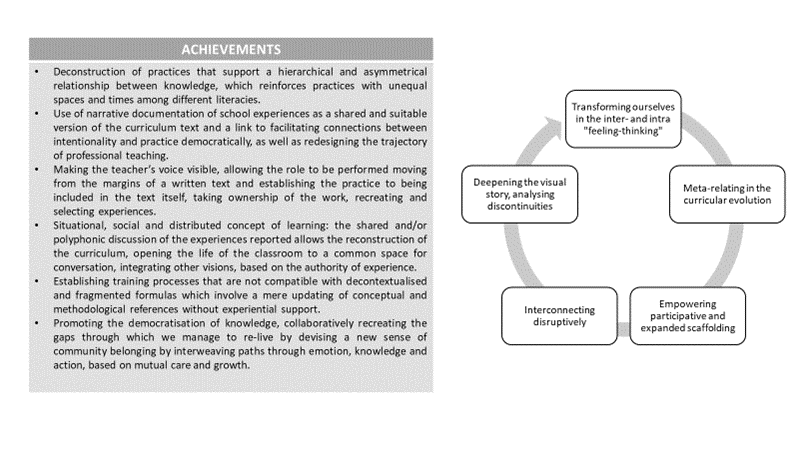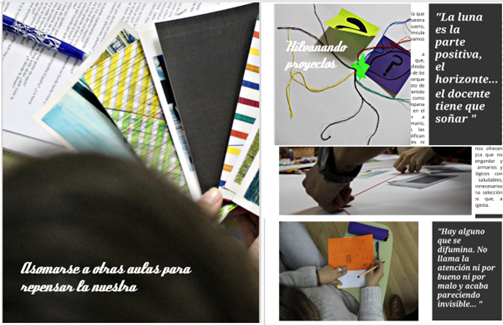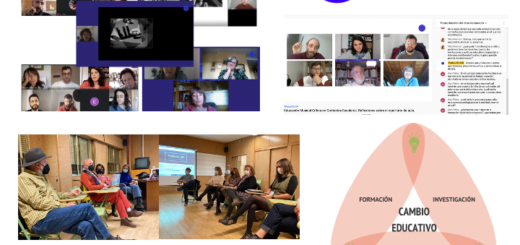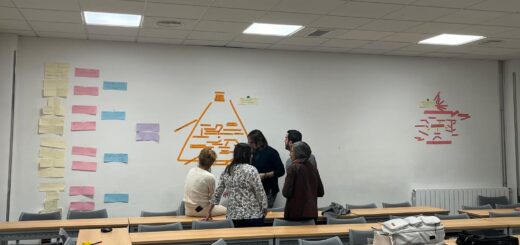Re-situate and transit the transformation of university praxis from the visual narrative enquiry
In this area of work, we have been developing a research process to re-situate our university praxis by exploring the decolonial turn through the recreation of our classroom experiences. We aim to be able to generate and consolidate a collaborative scenario to share our reflections on the work of community teachers along a path that is open to the possible, in which the different ways of relating the educational experience can converge, mediating the establishment of relationships and the meanings generated about our practice. In parallel, we arbitrate reflection on the strategies promoted to enhance the professional development of the participants, analysing the findings and difficulties of the research process itself.
In the face of the reductionist, homogenising and dehumanising tendency that contaminates the learning process, it is necessary to opt for a praxis that places pedagogical reflection at its epicentre. To this end, it is crucial to approach a critical re-reading of the context at a local level, seeking spaces of coexistence that allow us to contrast the teaching model that we are co-constructing according to the commitments that we assume to achieve a sentimental praxis (Espinosa, 2020), providing alternative ways of doing that allow us to re-signify and imagine another future (Moreno, 2020). In doing so, we shorten the distance between our feeling, thinking, and acting with others, looking for the cracks to dream and collectively sow emancipatory and disruptive tasks (Walsh, 2020).
But to systematise reflection on transformation and professional development, prioritising the relational and inter-contextual nature of the participatory process, it is necessary to experiment with different languages and formats that, together with the strengthening of the establishment of horizontal relationships, facilitate free expression, breaking the dominance of written language in the generation of knowledge. That is why, in our research process, we tried to implement the transformation by seeking new ways of producing knowledge and reflecting on it, conveyed by visual narrative (Aberasturi-Apráiz et al, 2022).
From this approach, we have recently developed a research project in which a mixed group of professionals made up of teachers from different schools, advisors from a Teacher Training Centre in our community and teachers and students from the University of Cantabria took part. Within a broader framework of Participatory Action Research, we carried out a training process, over two school years, focused on producing and analysing different narratives to recreate our concerns and critical incidents around teaching, enabling the crossing of different professional trajectories and different contexts and educational stages.
The production of different narratives allowed us to cultivate the necessary links to share interests and concerns about the transformation of practice, recreating curricular visions, models of participation, relationships, and knowledge (Rivas-Flores et al., 2022). We began to question our role as teachers, our responsibility, and the place we occupy in the micro-worlds we inhabit, dotted by the school profession. We facilitated spaces of participatory convergence between initial and ongoing teacher training, enabling a crossroads between teachers with different trajectories; a confluence of possibilities of free expression to mobilise curricular transformation based on enquiry and estrangement (Anguita, Hernández and López, 2018).
In the framework of our last formative action, one of the most visually significant episodes was constructed from the recreation of dilemmas and concerns present in our classrooms and educational environments to generate a story about our classroom life. In this process we adopted a double challenge, training our gaze beforehand to appropriate a modus operandi in the production of the story, self-analysing our reality to subsequently unfold our dilemmas in the collective plot of the formative group story. And to undertake the opening and collective visual narration, we decided to create a polyphonic narrative, generating, in the manner of a ‘Frankenstein’ classroom, a classroom made up of fragments of our realities, a classroom of classrooms. In this way, we managed to move through individual dilemmas in search of collective dreams of improvement.
And in this process of searching for crossroads, over the morning sessions of our subjects, we found the opportunity to integrate the university students’ accounts of the internship period, to be able to rescue and relive some of the significant experiences that took place during this period, as well as to share them with the participants in the training action process. In this way, we made them accomplices of the relevance of establishing bridges between initial and continuing teacher training, making explicit the teaching concerns that lead us to explore and locate these cracks in the university scenario. We crossed the spatial-temporal limits that corseted the activities usually generated in these scenarios, expanding, seeking other audiences to rewrite ourselves from other unforeseen places, which give room for strangeness, surprise, and uncertainty.
We intend to continue on this path, generating and deconstructing visual narratives to optimise the visibility of the experiential fabric, to make explicit the intra-actions (Colmenares, 2021) that have been generated in the communicative spaces as a result of the shared rereading of the visual narratives and the different narrative techniques used; we are committed to continuing to raise the possibility of counteracting the hegemonic and official versions of teaching practice, increasing the production of parallel emancipatory narratives in new formative encounters.

Image: reviewing the significant milestones of the process. (Fernández-Díaz, Rodríguez-Hoyos y Calvo Salvador, 2023)
References
Aberasturi-Apraiz, E., Correa J.M, and Gutiérrez-Cabello A., (2020). Between the biographical and learning. Infancia, educación y aprendizaje, 6 (1), 75-90.
Anguita, M., Hernández, F. y López, J. (2018). Las trayectorias de aprendizaje en los proyectos de indagación como foco de la acción educativa. Dosier Graó, 3, 42-45.
Colmenares, E.E. (2021). Exploring student teachers’ ‘stuck moments’: affect[ing] the theory-practice gap in social justice teacher education. Professional Development in Education, 47 (2-3), 377-391.
Espinosa, D. R. (2020). Latidos sentipensantes de un maestro como forma de resistencia a la calidad de la educación. Márgenes, 1 (3), 291-313.
Fernández-Díaz, E. Rodríguez-Hoyos, C. y Calvo Salvador, A. (2023). Promoting participation through visual narrative inquiry to recreate teacher learning-practice. Professional Development in Education, https://doi.org/10.1080/19415257.2023.2193196
Giroux, H., Neut, P., & Ribera, P. (2022) Pedagogies of precariousness in the neoliberal educational order: insecurity and recomposition of possibilities in the current political-pedagogical context. Foro de Educación, 20 (2), 39-60.
Moreno, M. (2020). De las visualidades insurrectas a las constelaciones translúcidas. Una propuesta teórico-metodológica para abordar prácticas audiovisuales disruptivas. Revista Antropología del Sur, 13, 1-26.
Rivas-Flores, J. I, Márquez-García, M. J., Leite, A. y Cortés-González, P. (2020) Narrativa y Educación con perspectiva decolonial. Márgenes, Revista de Educación de la Universidad de Málaga, 1(1), 46-62.
Walsh, C. (2020). De-Humanities and De-Humanizations: Decolonial Reflections on Knowledge and Higher Education in the Present Times. Korean Studies Quarterly, Spring 2019.

Authors:
Elia Fernández Díaz,
Adelina Calvo Salvador y
Carlos Rodríguez Hoyos
Grupo Global Education.
Investigación de nuevos escenarios para la ciudadanía global. Universidad de Cantabria






